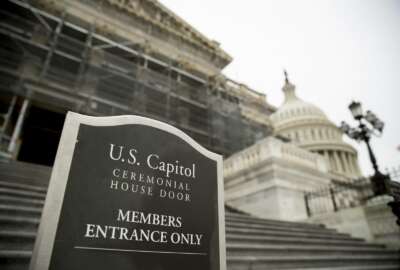To listen to the Federal Newscast on your phone or mobile device, subscribe on PodcastOne or Apple Podcasts. The best listening experience on desktop can be found using Chrome, Firefox or Safari.
- A federal interagency strategy from the Agriculture Department, the Food and Drug Administration and the Environmental Protection Agency, looks to reduce food waste. The strategy focuses on six key areas, including enhancing interagency coordination, and encouraging food waste reduction at federal facilities. (U.S. Department of Agriculture)
- Familiar proposals to cut federal retirement are absent from a new House budget proposal. While House Democrats have not put forth a budget resolution for 2020, the measure they’re considering does not include reconciliation instructions to find several billion dollars in savings through cuts to federal retirement. Instead, the House measure would set spending limits for 2020 and 2021. Senate Majority Leader Mitch McConnell (R-Ky.) said congressional leaders will put together a group to discuss plans to reach a two-year spending deal. (Federal News Network)
- USDA Secretary Sonny Perdue said House Democrats will come around on USDA’s relocation proposal once they see the agency’s final cost-benefit analysis. USDA asked for $25 million to cover relocation costs of its proposed move of the Economic Research Service and National Institute of Food and Agriculture. A group of House Democrats have urged lawmakers to not budge on the funding request. Perdue said he’s not sure his agency needs an appropriation to move ahead with its relocation plans. (Federal News Network)
- IRS commissioner Chuck Rettig wants the authority to hire short-term IT talent in a matter of weeks, not months. He told a House Appropriations subcommittee that President Donald Trump’s fiscal 2020 budget request would reauthorize critical pay authority for the IRS until the end of fiscal 2023, allowing the agency to hire up to 40 IT experts within a six-to-eight week timeframe. Rettig told lawmakers it currently takes an average of six-to-eight months to hire new employees. (Federal News Network)
- Agencies have new requirements for how to store digital, temporary records. The National Archives and Records Administration issued a final rule outlining a revised electronic record management regulation, which includes standards for digitizing temporary federal records. NARA said temporary records constitute the majority of federal records. Under the new rules, agencies may dispose of the original source records as long as they follow five steps, including capturing all information from the original source and protecting against changes or deletions. (Federal Register)
- Two senators hope to cut the amount of paper the federal government uses. Sens. David Perdue (R-Ga.) and Sheldon Whitehouse (D-R.I.) brought forth the Federal Register Modernization Act. It would prohibit the Government Printing Office from automatically printing copies of the register for Members of Congress or federal employees for free. The senators said the bill would better utilize technology, ease administrative burdens placed on agencies and promote the register’s dedication to using digital platforms to better inform the public. (Sen. David Perdue)
- The Small Business Administration’s Office of the Chief Information Officer plans to update its Cybersecurity Assessment and Management (CSAM) tool, before the end of the month. This comes after the SBA’s inspector general found it’s cloud systems inventory, as well as its cloud migration efforts, fell short of governmentwide risk management, cybersecurity and data mobility standards. The CIO’s office said the update will demonstrate to auditors that vulnerability and baseline teams are using CSAM to update the agency’s cybersecurity plans. (Oversight.gov)
- The General Services Administration and the Office of Management and Budget have fallen short in putting the building blocks in place for the new payroll shared services effort. The Trump administration’s lacks an implementation plan and has not identified or documented specific key roles and responsibilities for its payroll modernization initiative called NewPay. The Government Accountability Office found several weaknesses in OMB and GSA’s planning that could jeopardize the effort to move federal payroll providers to modern technology. OMB and GSA told GAO the administration is taking several steps to fix the shortcomings, including creating a NewPay implementation plan and a Task Order Review Board to administer standards and review all task orders for compliance with those standards. (Government Accountability Office)
- It’s taking the Defense Department too long to implement new acquisition laws, so House Armed Services Ranking Member Mac Thornberry (R-Texas) is prepared to punish the Pentagon if necessary. Thornberry said he’s considering fencing some DoD funds in the 2020 defense authorization bill to light a fire under the department’s feet. Thornberry said there are still laws DoD has not moved on which could help with innovation and bringing nontraditional companies into the Pentagon’s fray. (Federal News Network)
- Air Force Gen. John Hyten was nominated as the vice chairman of the Joint Chiefs of Staff. Hyten is currently the commander of U.S. Strategic Command. He also served as the commander of Air Force Space Command. If confirmed, Hyten will take over the vice chairman position from Gen. John Selva. (Department of Defense)
- After extreme weather caused billions of dollars of damage to military bases in the past year, Congress wants answers on other bases that may be in danger. DoD said Hill Air Force Base in Utah is the most susceptible military installation in the United States to climate change. The evaluation came from a Pentagon report ranking the top 10 military bases in each service threatened by climate change. Other highly threatened bases include Ft. Hood in Texas and Naval Air Station Key West in Florida. Rep. Jim Langevin (R-Okla.), who requested the report, said the study was rushed and failed to address overseas bases.
- A former employee with the U.S. Army Reserve plead guilty to wire fraud and stealing government money. The Justice Department said Ramon Torry was involved in a kickback scheme surrounding a contract with a production company to create a public service announcement, touting the 63rd Regional Support Command’s accomplishments. He will be sentenced in July. DOJ officials said he stole over $400,000 worth of government funds. (Department of Justice)
- The maximum amount of educational benefits the Department of Veterans Affairs will pay under the GI bill, is going up 3.4% next year. VA announced new tuition benefits for veterans who use the GI bill to attend public or private universities, or vocational flight or correspondence schools. Benefits for the new academic school year will range from nearly $12,000 to $24,000. (Federal Register)
- The State Department launched a new way to warn travelers of risk areas. It’s called the K-indicator, and it stands for kidnapping or hostage-taking. State added the indicator to travel advisories for 35 countries, meaning people who travel there face elevated risks of being taken. The K-labeled nations include Mexico, the Philippines, Turkey and Ukraine. The K appears in a circle at the top of the country’s online listing, along with existing warnings for crime, terrorism, civil unrest and war. (Department of State)
Copyright
© 2025 Federal News Network. All rights reserved. This website is not intended for users located within the European Economic Area.



